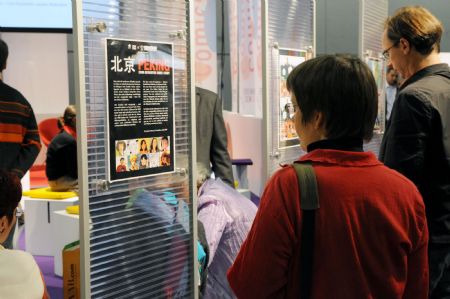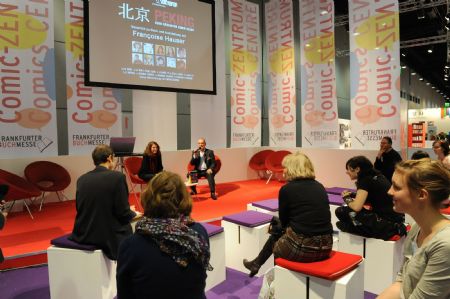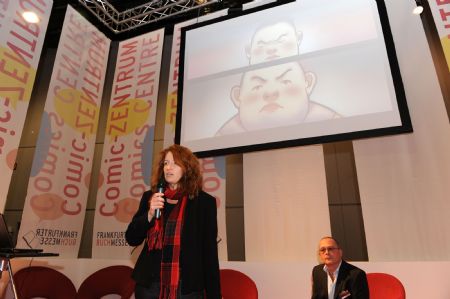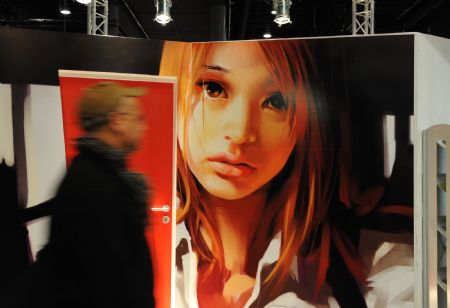Chinese comic books exhibited in Frankfurt
An exhibition of Chinese "manhua," or comics, titled "Beijing, ten faces of one city," was launched at the Frankfurt Book Fair on October 14.
 |
|
Visitors read a poster of Chinese cartoons at the 61st Frankfurt Book Fair in the central German city of Frankfurt, Oct. 14, 2009. [Xinhua] |
The exhibition, hosted by the German branch of the U.S. publishing house Tokyopop, showcases the works of ten "manhua" artists who present their impression of Beijing, the Chinese capital.
The exhibition showcases around 50 enlarged comics taken from the book "Peking, ten faces of one city," which has recently been launched on the German market and contains, among others, works of "manhua" artists Ji An, Liang Yi, Liu Wei, Song Yang, Nie Jun and Cheng Cheng.
The themes of the comics range from the transformation of the city's old quarters, the selection of participants of the Olympic Games to environmental pollution and the difficulties of growing up in modern China, thus providing insights into the situation of the Chinese capital from a very personal and private viewpoint.
|
|
|
A cartoon forum is held at the 61st Frankfurt Book Fair in the central German city of Frankfurt, Oct. 14, 2009. [Xinhua] |
Dr. Joachim Kaps, the managing director of Tokyopop, said his company is eager to introduce Chinese Manhua to German readers.
"Germany already has a lot of Japanese manga enthusiasts. We very much hope to introduce Chinese manhua to the German market," he said.
Kaps revealed that his publishing house plans to launch further Chinese Manhua books, like the works of Zhang Bin, known as "Benjamin," and other Chinese artists.
Manhua has been the latest rage in China for the last few years, and slowly European readers have started to discover the new styles of Chinese manhua as well.
The Chinese expression "manhua" derives from the Japanese "manga" and uses the same characters, which, in Japanese, can be literally translated as "funny pictures."
Although manhua has been strongly influenced by the Japanese manga, the current manhua boom in China is not only due to the import of Japanese comics. China has its own comic tradition.
Even in the 1880s, the so-called "lianhuanhua," palm-sized little booklets with picture stories and accompanying texts that were sold in market stalls, helped to provide affordable entertainment to the general public and were later used to promote religious and political ideas.
|
|
|
German journalist Francoise Hauser introduces Chinese cartoons during the cartoon forum at the 61st Frankfurt Book Fair in the central German city of Frankfurt, Oct. 14, 2009. |
In addition, Chinese is a very symbolic language, just as Kaps pointed out: "Each (Chinese) character is individual, just like a little comic in itself. No wonder, Chinese are open to manhua and readily accept comics as part of modern literature."
Currently modern manhua has a distribution of about three million titles a month in China, but is expected to grow in the future.
The manhua show "Beijing, ten faces of one city" is going to last until Oct. 18, the last day of the book fair.
|
|
|
A visitor passes a poster of Chinese cartoons at the 61st Frankfurt Book Fair in the central German city of Frankfurt, Oct. 14, 2009. [Xinhua] |
 0
0 










Comments